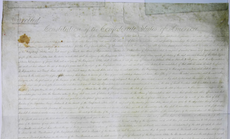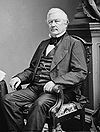Charles Magill Conrad
Charles Conrad | |
|---|---|
 | |
| Member of the C.S. House of Representatives from Louisiana's 2nd district | |
| In office February 18, 1862 – March 18, 1865 | |
| Preceded by | Constituency established |
| Succeeded by | Constituency abolished |
| Acting United States Secretary of State | |
| In office October 25, 1852 – November 5, 1852 | |
| President | Millard Fillmore |
| Preceded by | Daniel Webster |
| Succeeded by | Edward Everett |
| 22nd United States Secretary of War | |
| In office August 15, 1850 – March 7, 1853 | |
| President | Millard Fillmore |
| Preceded by | George W. Crawford |
| Succeeded by | Jefferson Davis |
| Member of the U.S. House of Representatives from Louisiana's 2nd district | |
| In office March 4, 1849 – August 17, 1850 | |
| Preceded by | Bannon Thibodeaux |
| Succeeded by | Henry Bullard |
| United States Senator from Louisiana | |
| In office April 14, 1842 – March 3, 1843 | |
| Appointed by | Andre B. Roman |
| Preceded by | Alexandre Mouton |
| Succeeded by | Alexander Porter |
| Personal details | |
| Born | Charles Magill Conrad December 24, 1804 Winchester, Virginia, U.S. |
| Died | February 11, 1878 (aged 73) New Orleans, Louisiana, U.S. |
| Political party | Whig |
Charles Magill Conrad (December 24, 1804 – February 11, 1878) was a Louisiana politician who served in the United States Senate, United States House of Representatives, and Confederate Congress. He was Secretary of War under President Millard Fillmore and, briefly, Franklin Pierce, from 1850 until 1853. Conrad also briefly acted as the United States Secretary of State following the tenure of Daniel Webster.
Biography
Charles Magill Conrad was born in Winchester, Virginia, in 1804, moved to Mississippi with his family as a boy, and later moved to Louisiana. He was educated under a Dr. Huld in New Orleans. He was appointed to the U.S. Senate in April 1842 to fill the unexpired term of Alexandre Mouton, serving to March 1843, and was defeated for reelection in his own right. He later served in the House of Representatives from 1849 to 1850, resigning to accept appointment as Secretary of War in Fillmore's cabinet. Conrad remained in charge of the War Department from August 15, 1850, to March 7, 1853. He was a leader of the secession movement in Louisiana in December 1860. During the American Civil War, under the Confederate States of America, he served as a delegate to the Provisional Constitution of the Confederate States as a member of the Provisional Congress of the Confederate States, and as a representative from Louisiana to the Confederate Congress, 1862–1864. Following the war, he resumed the practice of law. He died in New Orleans in 1878.
See also
References
- This article incorporates text from a publication now in the public domain: Wilson, J. G.; Fiske, J., eds. (1900). . Appletons' Cyclopædia of American Biography. New York: D. Appleton.
External links
- Charles Conrad biography at the United States Army Center of Military History
- "Charles Magill Conrad". Find a Grave. Retrieved March 10, 2014.
- United States Congress. "Charles Magill Conrad (id: C000703)". Biographical Directory of the United States Congress.






